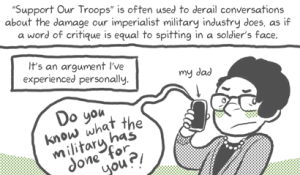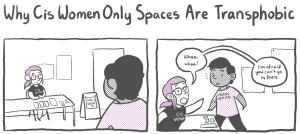If you’re a white person who has been in many activist spaces, then you’ve probably experienced a specific, often unspoken ground rule: There’s no room for white tears in this space.
This sort of rule is instilled because oftentimes, in other spaces, your emotions, and the emotions of other white people, are constantly centered, nurtured, and coddled when it comes to conversations about race.
Rather than focusing on the lived experiences and traumas of People of Color when talking about racism, the focus is placed on the host of emotions that white people go through when confronted with racism.
Rather than focusing on how People of Color feel on an everyday basis from having to deal with racist institutions, interpersonal relationships, and ideologies, the focus goes to white people just beginning to confront how they benefit from racism on many levels.
As a Woman of Color, I’m a pretty big fan of the “no white tears” rule.
It’s nice to be in spaces where I can feel free to say what I want, talk about complex systems of white supremacy, and express my frustrations without having to worry about the feelings of the white people in the room.
However, I also think that if you’re a white person, it can leave you without the space to fully deal with you emotions. I know many white people who do anti-racism work. They commit endless time and energy to be in full solidarity with People of Color. However, many of them often bury their own emotions or aren’t taught to fully deal with their feelings about their whiteness.
As a white person who does this kind of work, chances are you have encountered the same kinds of issues. In your work, you might not have had room to confront your emotions of guilt, fear, anger, or confusion.
While it’s important for all folks to stop centering the emotions of white people in our activism and in our lives, it’s also important for you, and all white people, to be able to process your emotions.
Because while most of the white activists I interact with know that discomfort is a part of the anti-racism process, they also don’t give themselves space to navigate facing their privileges, negative emotions, and deconstructing white supremacy. Chances are that you don’t either.
Below is a list of some of the ways that can help you to not center yourself in conversations about race and to process your own emotions.
1. Pause Before Contributing to the Conversation
I had this one white friend who would constantly send me links that would have explicit videos, photos, and commentary about racism.
Sometimes, she would add her own two cents to these links, saying things like “OMG! Isn’t this terrible!” and “My aunt said the most racist thing about this article.” But sometimes she would just send me the links with no warning, exposing me to incredibly violent and triggering images.
I finally had to tell her to stop sending me articles because I didn’t need to see them.
I was already aware of the things that were going on, and even if I wasn’t, I didn’t need to hear her commentary about how awful things were. What my friend thought she was doing was showing solidarity with me by starting conversations about racism and activism.
She wanted to show me that she was aware of what was going on, and that she actively condemned violence against communities of color. What she was actually doing was making me vastly uncomfortable and making me wonder why she felt the need to constantly prove how not racist she was.
By her always passing on painful content and making sure I knew how she felt about it, it did nothing more but give me negative feelings. At best, I was annoyed because it felt like she was trying to educate me about issues in my own community.
At worst, I had panic attacks and got very angry that she wasn’t even thinking about how her actions would affect me.
I see this happen often in conversations, seminars, and other situations. White people will sometimes just continuously share their own thoughts, experiences, and knowledge about a certain issue without ever pausing to see that this can negatively impact People of Color.
I know that you do it in order to prove that you’re a “good white person,” but it comes off as if you are patronizing everyone in the room.
It also comes off as a weird sort of competition – where you’re trying to prove how much you know about racism, often to the point of speaking over the People of Color in the room.
What you need to do is understand that your voice does not always need to be heard. Part of white supremacy as a larger system is the idea that white people are “objective” and authorities over everyone else in the room.
This kind of socializing can – and does – carry over even for white folks who do active anti-racism work. Remember that while your experiences shape your worldview, they’re not the most important experiences in the room.
Anti-racism is a learning process. And when you’re learning, it’s always important to pay attention more to what others are saying and how they are feeling than it is to prove how much you know.
2. Check the Other White People in the Room
A white friend of mine shared something I had written about racialized misogyny on his Facebook page, which I was definitely okay with.
What I wasn’t okay with, however, was when one of his white, male friends posted a comment that began with “Well, I don’t think that’s correct, my opinion is…” and ended with “…and that’s just what I think. I mean, I didn’t read the whole thing.”
I waited a few hours for my friend to call out this other white person for the many harmful, reductive things he wrote in his post, but that never came.
I know it’s “just” Facebook, but I’m gonna be real: I felt hurt and betrayed. This white friend of mine is someone who I trust and would label an ally.
But in that moment, all I could think was: Oh, so you can talk a big game to my face, but you can’t even defend me or check your white friends? What, is he just waiting for me to go off so that he can “like” my comment to look like he’s showing up for me?
Unfortunately, this wasn’t the first or last time I’d felt that way about a white person who I know does anti-racism work. I’ve noticed that sometimes, white people who do really great work just don’t talk to the other white people in their lives.
It’s like you’re all fine preaching at and talking to and listening to People of Color, but just stay silent when it comes to other white people.
And look, I get it.
When it’s your family members or old friends or co-workers that say or uphold racist ideas, it can be hard to confront them.
There are many folks in my life, both white and People of Color, that have internalized oppressive ideologies. Sometimes it’s too hard for me to get into conversations with them, either because I’m exhausted or I just can’t handle their emotional backlash in the moment.
And that’s okay – sometimes you just can’t handle educating someone in the moment.
But the thing is, as a white person, you have to constantly educate other white people. If you are truly committed to anti-racism work, it has to be part of your everyday life.
I know that whiteness isn’t a protection. When you confront conservative family members who are blatantly racist or your liberal boss who “totally isn’t racist, but,” there are consequences. Personal safety has to come into account when talking to people about unlearning and dismantling racism.
But when you don’t confront other white people, the onus always – and I literally mean always – falls on People of Color.
And whether that means we have to constantly exhaust ourselves teaching the white people who are willing to at least half listen or whether that means we become the victims of white people who exert violence on us, we are the ones who have to bear the brunt of white supremacy.
While you might have to have an uncomfortable conversation for a few minutes, we’ll have to deal with racism for the rest of our lives.
When you stay silent in the face of racism, it tells other white people, “What I’m doing is actually okay, cause if this person isn’t calling me out, then it must be okay!”
Because the truth is, the system of white supremacy teaches us all that People of Color are too emotional, are just complaining about things, and don’t know what we’re talking about. Many white people just don’t, or won’t, listen to People of Color when we talk about our experiences with racism.
We need you to put aside your own reasons for not wanting to confront other white people. We need you link to our articles, share our stories, and explain why racism is an actual thing.
3. Excuse Yourself If You’re Having Strong Emotions
A few months ago, I was in a professional setting with a few other folks, some white and some People of Color. We had been discussing police brutality. Many of the Black folks and other People of Color in the room were having a very difficult time. It was a hard but healing kind of conversation.
That is, until one of the white women in the room began to cry.
She began to speak, mentioning that she knows police violence doesn’t affect her directly, but that she was having a hard time dealing with everything.
The tone of the conversation shifted. Half of the people in the room went to comfort her. The other half, myself included, began to roll our eyes, cross our arms over our chests, and completely tune the discussion out. The only thing going through my mind was, Why do we have to deal with her right now?
Everyone was having a tough time. I don’t want to fault this woman for feeling overwhelmed. But it was also deeply inappropriate for her to be crying in that space.
She took a conversation that predominately affected the Black folks in the room and made it about her white woman tears. It forced half of the room to cater to her, and alienated the other half.
As a white person in an anti-racist conversation or space, it’s important to be in touch with your emotions. You need to be aware of yourself, especially when you experience strong emotions like sadness, anger, and guilt.
If you find yourself having a strong emotional reaction during conversations about racism and there are folks in the room who experience that violence firsthand, excuse yourself from the situation.
This is especially important if you’re finding your emotions manifesting themselves in physical ways – including crying, shouting, needing to be hugged, and other reactions. Just remove yourself from the situation. Have a few rituals or practices planned to help you calm down before you reenter the situation.
Your emotions and reactions are valid. You as a person are allowed to experience and work through whatever is happening for you.
But you also need to understand it should not be anyone’s place to have to comfort you when you’re confronted with your own whiteness and white supremacy.
Too often, People of Color are pushed aside so that white people feel safe and calmed. This is racism in itself. So understand where you’re at emotionally, gauge the situation that you’re in, and think about the ways you can make sure you deal with your emotions in an appropriate setting.
4. Have a Support System of Other White People
A few months ago, I remember a close white friend of mine commenting, “I need to make more white friends that I can have anti-racism conversations with.”
To be completely honest: I had looked at them incredulously and blurted out, “But why?”
My friend stared back at me and said, “Because I need to talk about my emotions sometimes, and it’s not things that are appropriate to say to you or my other friends of color.”
I had never really thought about that before, but I realized they were totally right. Everyone needs to vent once in a while. Everyone needs to have their emotions validated. Everyone needs space to work through what they’re feeling.
Anti-racism work isn’t a one-and-done type of deal. It’s a lifelong learning process. It’s only natural that you’ll make mistakes, feel burnt out, or just question why everything feels so difficult all the time.
And the truth is that if you’re feeling this way, then that’s good – it means that you’re constantly pushing yourself to understand the ways in which white supremacy is an incredibly violent system.
But feeling those kinds of emotions isn’t necessarily good for you personally. What I mean is that your hurt, guilty, or angry feelings are valid. And you need to have room to deal with those feelings in a constructive way.
Unfortunately, you dealing with those feelings by unloading or processing with People of Color can do more harm then good.
When you work through these feelings with a Person of Color, it can be silencing to the emotions that we are feeling.
People of Color should not have to listen to your feelings about racism. Having to do so forces us to put aside our own complex emotions. It is also exhausting – because intentionally or not, you unloading on a Person of Color says, “My having to face my whiteness and the complex emotions that come with that is more important then the ways in which whiteness is a tool of violence against you.”
One of the healthiest things you can do is create a support group of other white people who are going through similar things.
Talking with, complaining to, and brainstorming with other white people helps all people involved. It gives you a sounding board to work through your guilt, discomfort, and uncertainty. It helps to understand that your emotions are valid, and that you’re not alone in your feelings.
And it also creates a space where you can recommit to anti-racism work without harming the folks who actually experience racism. It gives you space to brainstorm with other white people and figure out how you can be better allies.
***
I know this is all hard stuff to process.
These are all small, tangible steps that you as a white person can take to continue your anti-racism work.
It’s important to remember that your feelings are valid, and that being anti-racist is always going to be hard work. Showing up as effective allies means recognizing your own limitations and emotions. No one can do good work if they aren’t taking care of themselves.
But it’s also important to recognize that anti-racism work is always going to be hard. It will make you uncomfortable, and that’s okay. This is all a part of a true liberation process.
[do_widget id=’text-101′]
Jennifer Loubriel is a Contributing Writer for Everyday Feminism and a mixed race Afro-Puerto Rican from the Bronx. She is also a queer mujerista and child abuse survivor. She earned her B.A. from Oberlin College in Religion and English, and identifies as an amateur Latinx ethicist and a speculative fiction enthusiast. She is a co-founder and moderator over at the Tumblr Women of Color, in Solidarity, a safe space for and by women of color. You can usually find her writing about apocalypse and diaspora, rewatching her favorite TV shows, or taking selfies with her family’s cat.
Search our 3000+ articles!
Read our articles about:
Our online racial justice training
Used by hundreds of universities, non-profits, and businesses.
Click to learn more
Most Read Articles
- « Previous
- 1
- …
- 30
- 31
- 32





















